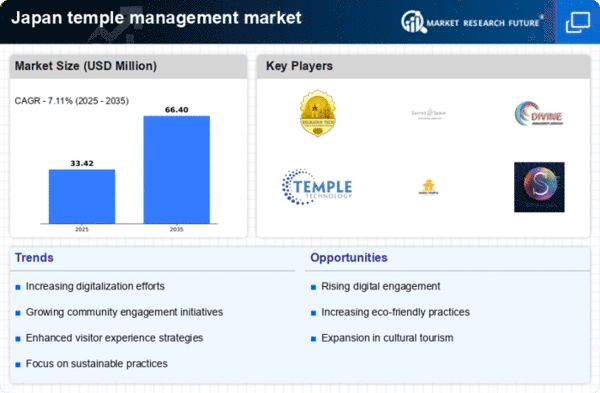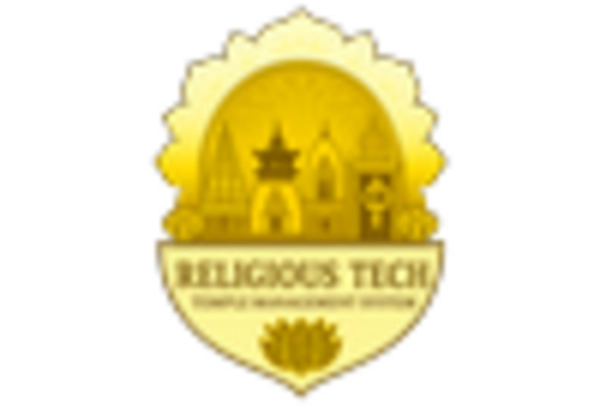Increased Tourism Demand
The temple management market in Japan is experiencing a surge in demand due to the increasing influx of tourists. In 2025, Japan is projected to welcome over 30 million international visitors, many of whom are drawn to the country's rich spiritual and cultural offerings. Temples play a crucial role in this tourism landscape, serving as key attractions. Consequently, temple management services are adapting to cater to the needs of tourists, including enhanced visitor experiences and improved facilities. This trend is likely to drive revenue growth within the temple management market, as temples seek to capitalize on the tourism boom. The integration of modern amenities while maintaining traditional aesthetics is becoming a focal point for temple management, potentially leading to innovative service offerings.
Cultural Heritage Preservation
The temple management market in Japan is significantly influenced by the need for cultural heritage preservation. Temples serve as vital repositories of history, art, and tradition, attracting both domestic and international visitors. In 2025, the Japanese government allocated approximately $500 million to support the restoration and maintenance of historical sites, including temples. This funding is aimed at ensuring that these cultural landmarks remain intact for future generations. As a result, temple management services are increasingly focused on implementing best practices in conservation and restoration, which may lead to a rise in demand for specialized management solutions. The emphasis on preserving cultural heritage not only enhances the appeal of temples but also contributes to the overall growth of the temple management market.
Community Support and Involvement
The temple management market in Japan is increasingly shaped by community support and involvement. Local communities recognize the importance of temples as centers for cultural and spiritual activities, leading to a growing trend of community engagement in temple management. In 2025, approximately 60% of temples are expected to establish partnerships with local organizations to enhance their outreach and service offerings. This collaboration may include hosting community events, educational programs, and volunteer opportunities, fostering a sense of ownership among residents. Such initiatives not only strengthen community ties but also contribute to the sustainability of the temple management market. By actively involving the community, temples can ensure continued support and relevance in an ever-changing societal landscape.
Digital Transformation Initiatives
The temple management market in Japan is undergoing a transformation driven by digital initiatives. As technology continues to evolve, temples are increasingly adopting digital tools to enhance operational efficiency and visitor engagement. In 2025, it is estimated that around 40% of temples will implement digital management systems, which may include online booking, virtual tours, and mobile applications. This shift towards digitalization is expected to streamline administrative processes and improve communication with visitors. Furthermore, the integration of technology into temple management practices could lead to increased revenue streams through online donations and merchandise sales. The emphasis on digital transformation is likely to reshape the temple management market, making it more accessible and appealing to a tech-savvy audience.
Regulatory Compliance and Standards
The temple management market in Japan is increasingly influenced by regulatory compliance and standards. As the government emphasizes the importance of safety and preservation, temples are required to adhere to specific regulations regarding maintenance and operations. In 2025, it is anticipated that new guidelines will be introduced, focusing on environmental sustainability and visitor safety. Compliance with these regulations may necessitate additional investments in management practices and infrastructure, potentially impacting operational costs. However, adherence to these standards is likely to enhance the reputation of temples, attracting more visitors and fostering trust within the community. Consequently, the focus on regulatory compliance is expected to play a pivotal role in shaping the future of the temple management market.
















